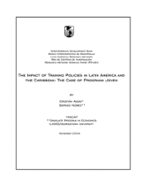The Impact of Training Policies in Latin America and the Caribbean: The Case of Programa Joven
Date issued
Nov 2004
Subject
Labor Policy;
Training and Development;
Workforce and Employment;
Youth and Children
Country
Argentina
Category
Working Papers
This paper evaluates Programa Joven, a training program conducted by Argentina's Ministerio del Trabajo. The paper adapts and applies a non-experimental evaluation methodology to answer the following questions: (1) Did Programa Joven increase the labor income of the trainees? (2) Did Programa Joven increase the probability of employment? (3) What was the rate of return to dollars spent on Programa Joven? The basic methodology used was the Matching Estimators approach. The application of this methodology requires two steps: first, the estimation of a model of program participation (propensity scores), and second, conditional upon the estimated propensity scores, the use of matching estimators to calculate the impact of the program. Three different information sources permitted the analysis of an additional question: how sensitive are program impact estimates to different propensity score specifications? The paper hypothesizes that impact estimates are in fact sensitive to different propensity score specifications. Additionally, the paper reports and compares the propensity scores estimated from each of these data sources, and then estimates the program impact on earnings and employment based upon these propensity scores. Finally, the authors carry out a cost-benefit analysis of Programa Joven based upon cost information and program impact estimates (benefits).



